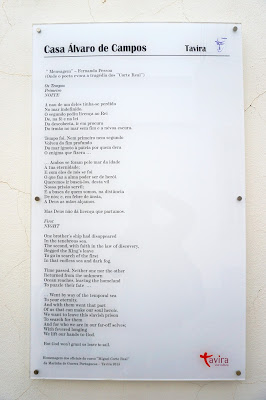"A few more
notes on this subject… I see before me, in the colorless but real space of
dreams, the faces and gestures of Caeiro, Ricardo Reis and Álvaro de Campos. I
gave them their ages and fashioned their lives. (…) Álvaro de Campos was born
in Tavira, on October 15, 1890… Campos, as you know, is a naval engineer (he
studied in Glasgow) but is currently living in Lisbon and not working. (…) Álvaro de Campos is tall (5 ft. 9 in., an inch taller than me), slim and a bit prone
to stoop. All are clean-shaven; (…) Álvaro de Campos, after a normal high school education, was sent to Scotland
to study engineering, first mechanical and then naval. During some holidays he
made a voyage to the Orient, which gave rise to his poem “Opiary.” An uncle who
was a priest from the Beira region taught him Latin.
How to I write in the names of these three? (…) Campos, when I feel a sudden impulse to write and don’t know what."
How to I write in the names of these three? (…) Campos, when I feel a sudden impulse to write and don’t know what."
--From a letter by Fernando Pessoa writing to Adolfo Casais Monteiro, 13 January 1935 (in The Book of Disquiet, Penguin Classics, 2002, p. 474.)
(photos with text best viewed in full-screen - left-click the picture and press F11)
After over 80 years since this letter was written, Tavira, a town located on the south coast of Portugal, in the region of Algarve, is still haunted by the imagination of Álvaro de Campos - one of the heteronyms used by Fernando Pessoa, reported by Pessoa to have been born in the town in 1890.
Álvaro de Campos himself has re-visited Tavira in his early 40s and wrote the following poem capturing his impression from his stay:
Notes on Tavira
“I finally arrived
at the town of my childhood.
I got off the
train, I remember, I saw, I compared.
( …)
Everything is old
where it used to be new.
Immediately – other shops, and other painted façades on
the same buildings …
A car I had never
seen … dark-yellow, stationary in front of a door that stood ajar.
Everything is old
where it used to be new.
Yes, because even
what is younger than me is becoming old like the rest.
The house that
they newly painted is older because they newly painted it.
(… )
I stop in front of
the landscape, what I see is me.
(… )
This town of my
childhood is in the end a foreign city.
(I am, of my own
volition, as ever, face to face with a stranger who is nothing to me).
I am a tourist
from a foreign land, a passer-by.
It is clear, this
is what I am.
Even in me, my
God, even in me.”*
Álvaro de Campos wrote some of Pessoa's most outstanding poems. Some of Tavira's walls are decorated with commemorative plaques with poems by de Campos in their original version and in their respective English and Spanish translations, a result of the initiative of the local association Casa Álvaro de Campos.
Take a walk through today's Tavira's meandering, cobblestone streets, with colorful and at times shabby façades, to arrive at the municipal library, which bears de Campos' name. The building, originally the town prison, was converted by architect Joio Luis Carrilho da Grasa who cleverly turned former prison's façade and cells into a splendidly modern and harmonious edifice.
The town center is infused with de Campos' presence, making Tavira a place permeated to the core by one writer's imaginary alter ego. It is a small Pessoa readers' paradise, where readers can fulfill their dreams. The local multilingual secondhand bookstore A Lura dos Livros has over 5000 books in stock and a substantial collection of titles related to Pessoa.
I am using this post as a springboard for more entries on Pessoa coming (hopefully) next year. It is worth noting that Pessoa was
a translingual writer himself - which definitely deserves to be covered
here in-depth!
All photographs by Sławek Wielhorski.
* Translation of “Notas sobre Tavira”. I located the English text here. Unknown translator.
References:
















Thanks for this, Slawek. Although I have known of Pessoa since 2014, I am coming to understand him more deeply, and THE BOOK OF DISQUIET is coming my way soon.
ReplyDeleteThe Alchemist
Pessoa is fantastic. I first heard of him in 2008 via TLO and have been preparing to read his prose ever since. Now that I am finally into him, I am afraid of losing myself in his enchanting prose to the point of never wanting to put down his books and subsequently bear the boredom of existence! ;-)
Delete